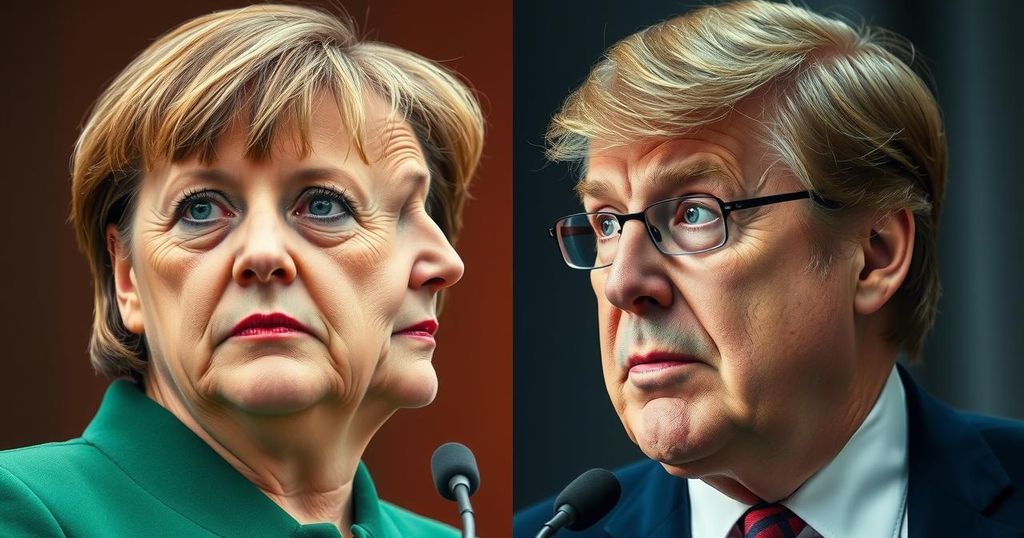Politics
AFD, ASIA, BUNDESTAG, CHINA, DEFENSE SPENDING, EUROPE, EUROPE/ASIA, EUROPEAN UNION, FREE DEMOCRATS, FRIEDRICH MERZ, GERMANY, GREEN PARTY, IMMIGRATION POLICY, JO, JÖRG LAU, MEXICO, NORTH AMERICA, POLITICS, POPULISM, PUTIN, REICHSTAG, RUSSIA, SCHOLZ, UKRAINE, VOLKSWAGEN, WORLD WAR II
Fatima Khan
0 Comments
Germany’s Political Turmoil: A Crisis of Leadership and Economic Stability
Germany is currently facing a political crisis marked by personal attacks among leaders as Chancellor Olaf Scholz’s coalition government collapses, leading to early elections. Economic turmoil, exacerbated by high energy prices and global competition, threatens its historically strong automotive industry. Extremist parties are gaining support, underscoring societal divisions, while the need for unified European leadership grows amidst geopolitical uncertainties, particularly related to the war in Ukraine and potential changes in U.S. policy under a new administration.
The current state of Germany is deeply concerning, characterized by a tumultuous political climate and severe economic challenges. Amid heightened tensions, Chancellor Olaf Scholz and his opponents resorted to personal attacks during a parliamentary debate, signaling a departure from Germany’s historically decorous political discourse. This development coincides with the collapse of Scholz’s coalition government, prompting early federal elections on February 23. With rising support for extremist parties on both the right and left, Germany’s socio-political stability is at risk, while the economy falters under the weight of high energy prices and shifting international competition.
Germany, once a bastion of economic power in Europe, is grappling with a crisis precipitated by rising energy costs and ill-fated managerial decisions within key industries. Leading car manufacturers, including Volkswagen, are contemplating mass layoffs due to international competition, particularly from Chinese electric vehicle imports. The shift in the balance of power complicates Germany’s political landscape, especially as far-right and far-left factions gain traction by opposing foreign policy directions and military support for Ukraine. The situation is further complicated by anticipated political shifts in France, risking a total collapse of collaborative European governance, particularly if Marine Le Pen ascends to the presidency.
The recent polarizing political climate reflects not just domestic discord but also challenges faced by the broader European leadership amid geopolitical tensions. The rise of the far-right Alternative for Germany (AfD) and the newly established far-left BSW party illustrates fragmentation within the political landscape, emphasizing a shift away from traditional parties. Concurrently, smaller nations like Poland and the Baltic states are emerging as new leaders advocating for a more robust European security posture against threats from Russia. As the potential for an unstable U.S. administration looms, European governments, particularly Germany and France, must exhibit coherence and strategize effectively to face pervasive external pressures.
The upcoming election serves as a pivotal juncture for German politics, necessitating a reassessment of party strategies and unifying approaches to governance. With the Christian Democrats poised to take a significant role, they must acknowledge their historical responsibility toward the nation’s current predicament while also addressing the urgent need for economic reinvestment. As the political discourse evolves, so does the expectation for leaders to rise above personal attacks, presenting robust visions for the future. Ultimately, this election will not merely reflect on the fate of Scholz’s coalition but could redefine the course of democracy and reinforce or challenge the fundamental structures of the German political system.
The political environment in Germany has become increasingly volatile, driven by a looming economic crisis and growing discontent among the populace. The debates in the Bundestag have turned mean-spirited, with political leaders engaging in personal attacks during discussions that historically emphasized decorum. Scholz’s coalition government has lost a confidence vote, leading to early elections and highlighting the fractures within Germany’s political structure. Additionally, the rise of extremist parties underscores a significant shift in public sentiment, threatening the stability of the German democracy amidst escalating challenges abroad, particularly in relation to the war in Ukraine and the intensifying geopolitical rivalry with Russia.
In summary, Germany is facing a confluence of political and economic crises that threaten its stability and international standing. The recent abdication of decorum in political discourse, combined with the emergence of extremist parties, has created an unsettling environment just ahead of critical elections. As Germany prepares to reevaluate its leadership and strategic direction, the necessity for cooperation amongst political factions has never been more pressing. How the nation responds to these challenges will determine not only its domestic future but also its role within the broader European context.
Original Source: www.theguardian.com




Post Comment